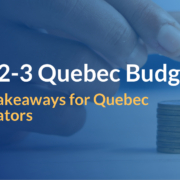Federal Budget 2022: Key Measures and New Funding for Canadian Innovators
Deputy Prime Minister and Finance Minister Chrystia Freeland unveiled the 2022 Federal budget on April 7, 2022. Titled “A Plan to Grow Our Economy and Make Life More Affordable,” the budget announces a number of changes to existing programs and new initiatives to fund the development of green energy, the circular economy and Canadian innovation.
The following article offers a brief overview of some of the highlights of the 2022 Federal budget and the impact these new measures may have on innovative Canadian companies in the years to come.
Updates to the SR&ED Tax Credit
After nearly three years of no major changes to the federal Scientific Research & Experimental Development tax credit program – the last significant modifications date back to 2019 – Budget 2022 officially announced that the program will be undergoing a formal review to find out if changes to the eligibility criteria are necessary. The review will also consider the possibility of implementing a “patent box” regime to encourage the development of innovative IP in Canada. A “patent box” essentially allows income earned from IP to be taxed at a lower rate than other business income, encouraging innovation.
This review was just announced, so we cannot be sure of its impact on the program at present. However, there are reasons to believe that any changes may expand access to the program and program funding, rather than restricting it. This is because expanding access to SR&ED was part of the Liberals platform for the 2021 election.
Creation of an Innovation and Investment Agency
Budget 2022 announces the creation of an operationally independent federal innovation and investment agency, with a planned budget of $1 billion for its first five years of operation – starting in 2022-3. Additional details have yet to be announced, but the agency’s mandate will generally be to work with existing and new businesses in crucial industries and help them make investments necessary for their growth and increase their competitiveness.
Creation of the Canada Growth Fund
This brand-new investment fund aims to attract private capital to Canada to encourage growth in strategic sectors and fund initiatives related to key economic goals like emissions reduction, low carbon technology development, supply chain restructuring, the development of the primary resource sector, and more. Funding will take a variety of forms, including equity, debt financing, and loan guarantees.
Introduction of a new Investment Tax Credit for Carbon Capture, Utilization and Storage
A new refundable tax credit, effective for projects starting on or after January 1, 2022, will be introduced to offset the cost of carbon dioxide capture and storage equipment purchases. This new credit’s rates will vary between 37.5% and 60% until 2030.
Additional Funding for the Development of Semiconductors
Innovation, Science and Economic Development Canada will receive $45 million over 4 years to engage in various activities aiming to support semiconductor projects and strengthen Canada’s place in the sector.
Additional Funding for Canada’s Superclusters
The budget plans for an additional $750 million in funding over 6 years for the 5 innovation superclusters to support projects and foster public-private collaboration in key economic sectors. The superclusters have also been officially renamed Global Innovation Clusters moving forward.
Making the SME lower tax rate more accessible
Canadian small businesses already benefit from the reduced federal tax rate of 9% on their first $500,000 of taxable income, a 6% tax cut from the general 15% federal corporate tax rate. The current rule only allows businesses to access this lower corporate tax rate as long as their level of capital employed in Canada stays under $15 million.
For taxation years beginning on or after April 7, 2022 – budget day – access to the reduced tax rate will instead be phased out gradually, and only businesses with $50 million or more in employed capital in Canada will be fully excluded from the reduced rate.
The goal of this measure is to incentivize small businesses to grow and make capital investments without drastically increasing their tax burden.
How R&D Partners can help
If you have any questions about this or other tax credit programs, do not hesitate to contact Jacob Ma at jma@rdpartners.com
Other Resources
This article is intended for general informational purposes only and does not constitute professional accounting or tax advice.









